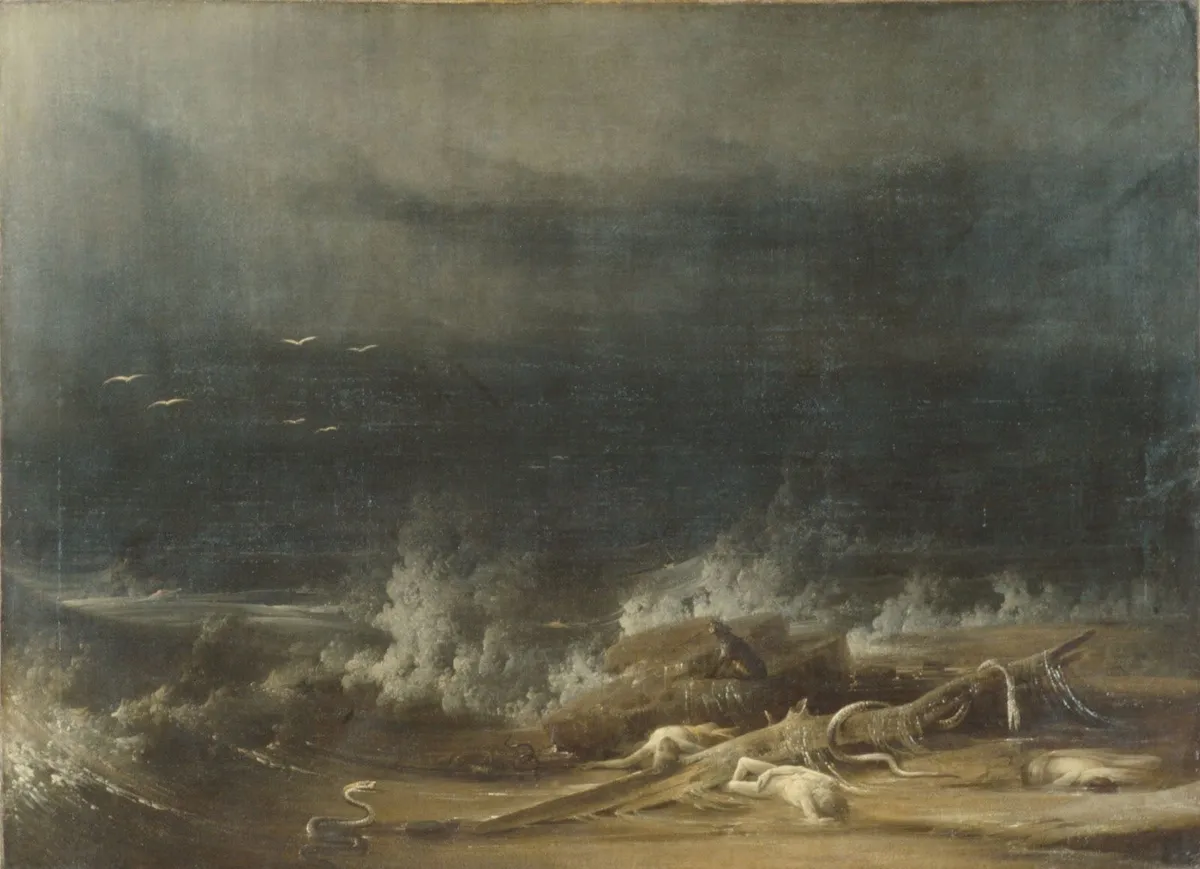What A Prophet Is(n't)
Or: Mediocre Won't Cut It

This is Life as a Sacred Text 🌱, an everybody-celebrating, justice-centered voyage into ancient stories that can illuminate our own lives. It‘s run on a nonprofit, so it’s 100% NAZI FREE. More about the project here, and to subscribe, go here:
The second thing God differentiated in the Creation story—after separating the light from the darkness—was the waters. The waters above (shamayim) from the waters below (mayim), with just that thin firmament holding everything at bay.
And then, a few generations after all of this, when
“God saw how great was humanity’s wickedness on Earth, and how every plan devised by their mind was nothing but evil all the time,” (Genesis 6:5)
God decides to do an almost total hard restart on humanity by way of water—rain for 40 days and 40 nights, covering up everything. Water from the heavens (mayim from shamayim, dig?) filling up the waters (yep, mayim again) down below. Un-differentiating in order to undo.
And who is tapped to be saved? This one guy, Noah (and his family, sure. Though his wife isn’t named in the Torah text, the Rabbis tell us that her name was Naamah).
“Noah was a righteous man; he was blameless in his generation,” (Genesis 6:9)
Genesis tells us. And, a chapter later, God says to him,
“you alone have I found righteous before Me in this generation.” (Genesis 7:1)

The Rabbis are split on what to make of this. “He was the best of his generation” means… what exactly? Was he actually righteous? Or just, like, righteous compared to all the immorality all around him? Was he good, or just less-bad?
With regard to the verse: “These are the generations of Noah; Noah was a righteous man, and wholehearted in his generations” (Genesis 6:9), Rabbi Yoḥanan says: Relative to the other people of his generation he was righteous and wholehearted, but not relative to those of other generations. (Talmud Sanhedrin 108a).
Is it good enough to just be… mediocre?
The Zohar, a Kabbalistic text that emerged in 13th c. Spain, compares Noah to Moses. That is to say, after the Israelites build and start worshipping a Golden Calf in the desert after the Exodus from Egypt, God suggests to Moses that the two of them start the Israelites over—let’s zap these jerks and try again. But Moses argues back, makes the case for saving the people, God relents, agrees to go back more or less to the original plan.
On the other hand, here, when God tells Noah to go build a boat because most of humanity is about to get offed? Noah is silent. As the Zohar notes,
“Noah did not plea for mercy on behalf of the world, and they all perished, because the Holy One, blessed be God, had told him that he and his children would be saved by the ark.” (Zohar 1:67b)
In other words, Noah didn’t lobby on behalf of everyone else because he and his were going to be OK.
Oof. It cuts.
It cuts like white liberals thinking that once a president they like is in office, they can go back to brunch and stop fighting for social justice. It cuts like everybody who keeps quiet in a meeting when their ideas are heard, even if someone else’s are talked over. It cuts like blaming the victim rather than addressing the problem. It cuts like not thinking too hard about privilege and how it functions. It cuts like every version of corporate feminism-lite that doesn’t look too hard at systemic policies, at the people at the people with the least power in the corporation, or at the people whose labor is outsourced.
Or maybe it cuts like: Silence every time a person is punished unjustly, is ground inside the teeth of mass incarceration, is condemned to death by government maleficence during a deadly pandemic for the sin of being found behind those bars in the first place.
Even if the people in the flood did commit harm, it tells us something about Noah that he didn’t even question whether there was justice in their annihilation.
Moses, on the other hand, goes to the mat for the people--the ones who definitely committed some hardcore idolatry the minute his back was turned, even after they got rescued from Egypt and everything--and makes it clear to God that he’s willing to put his own life and legacy on the line for them. He tells God that if God doesn’t forgive the Israelites,
"blot me, I pray You, out of Your book which You have written" (Exodus 32:32).
That’s what a prophet is.
That’s what a prophet does.
He ties his fate to everyones’ fate, everyone’s safety, everyone’s wholeness.
Noah’s complicity is so bad, the Zohar notes, that he is to be named for it the whole rest of history:
“Because Noah did not plead for them, the Flood waters are named after him, as it is written (and here the Zohar quotes Isaiah 54:9 as its prooftext): ‘for this is as the waters of Noah to Me; as I have sworn that the waters of Noah should no more go over the earth.’”
In other words, the Zohar is telling us, “I was just following orders,” isn’t a moral defense—even when the orders come from God.
We must use our voices, our positions, our opportunities, our capacities, when we have them, every time.
🌱🌱🌱🌱🌱🌱🌱🌱🌱🌱🌱🌱🌱🌱🌱🌱🌱🌱🌱🌱🌱🌱🌱🌱🌱
Like this? Get more of it in your inbox every week. 🌱
For free every Monday—sign up at the ‘Subscribe now’ button just below.
And if you become a paid subscriber, that's how you can get tools for deeper transformation, a community for doing the work, and support the labor that makes these Monday essays happen.
A note on the subscription model:
I want my work to be as accessible to as many people as possible, in as many ways as possible. That's why the Monday essays are free, and why we donate subscriptions to anyone for whom paying is a barrier to the House of Study posts.
I also believe people should be paid fairly for their work. Needless to say, these two values sometimes seem to be in conflict, but I do what I can to find a fair balance. I offer many resources for free, and charge for others. When you donate generously or pay at the top of our scale, that helps support the work I do, provides access for those who have fewer resources, pays for the infrastructure and the technical and practical support that it takes to do this, and helps us keep the work sustainable.
And as always, if you want in to the Thursday space but paying isn't for you now, just email support@lifeisasacredtext.com and we'll hook you up.
And if you’d like to underwrite one of these donated subscriptions, you can do so by signing up at one of the higher subscription points.
And if it resonated with you, please share this post.
Sending a big pile of blessings and goodness your way. 💕
P.S. Apropos of mediocre guys and not fighting for (or, uh, actively stacking the deck against) a more just world, this is a great book.


